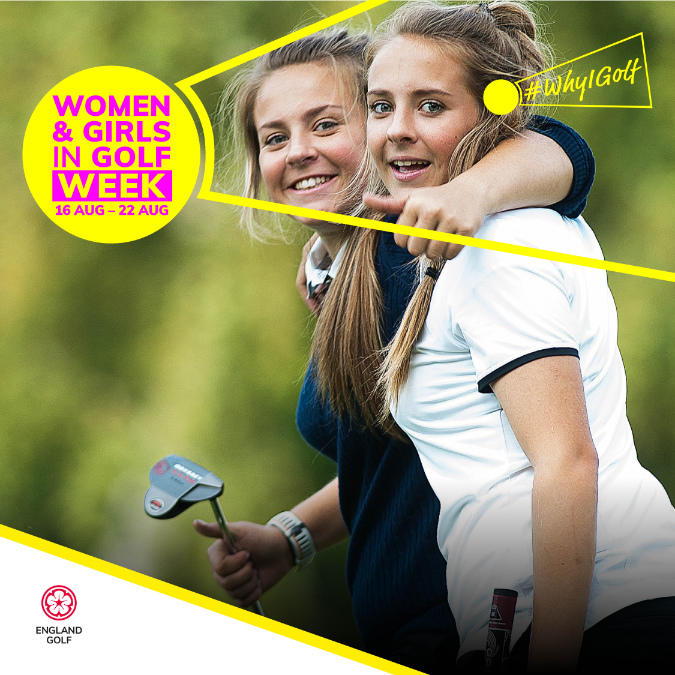- Homepage
- News and Features
- ‘Greenkeeping has given me the happiest moments of my life’
‘Greenkeeping has given me the happiest moments of my life’
Greenkeeping can be a fantastic career - as these four women can attest.
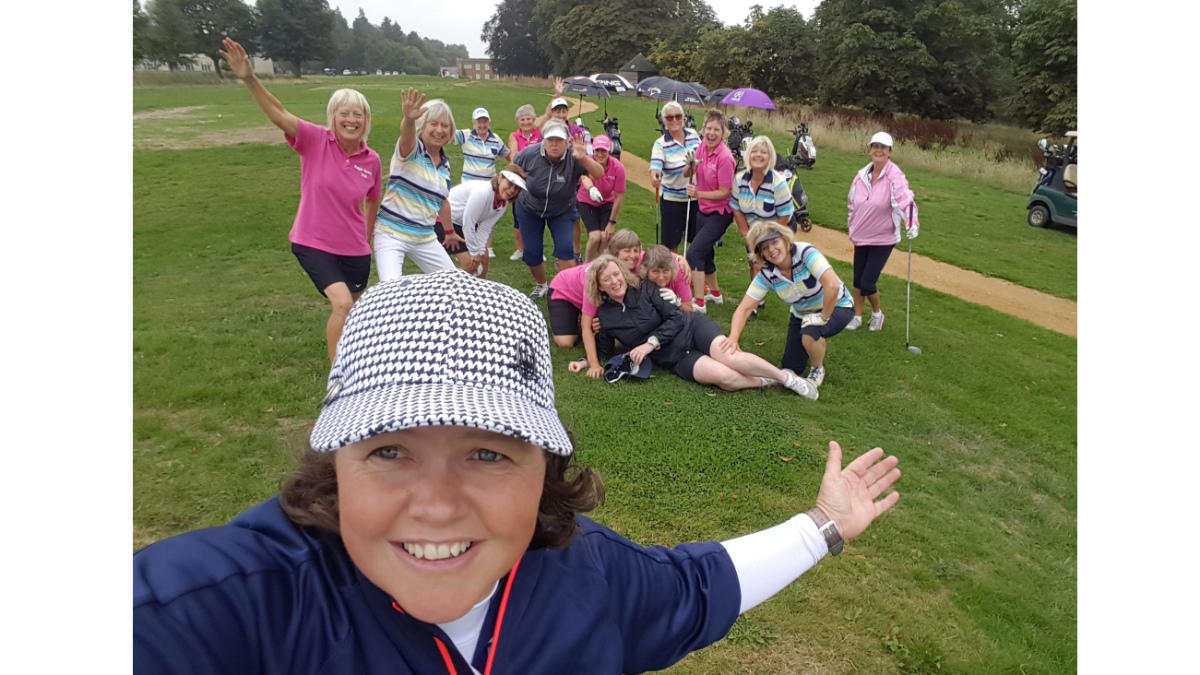
To coincide with England Golf's Women & Girls Golf Week, we spoke to four BIGGA members who also happen to be talented women greenkeepers.
Each of these four women has forged a fantastic career within the greenkeeping industry and they spoke to Women & Golf editor Emma Ballard about their experiences.
Emma has spent many years in golf, media and marketing and is a graduate of The R&A’s Women and Golf leadership development programme. She was appointed editor of Women & Golf in April this year.
Included below is just an extract of what they told us - you can view the entire conversation on the BIGGA website.
THE PANEL:
- Lucy Sellick, head greenkeeper at Wenvoe Castle Golf Club in South Wales.
- Amanda Dorans, R&A Scholar and sustainability coordinator at Gleneagles
- Anna Nilsson, deputy irrigation project manager and senior greenkeeper at The Belfry
- Sophie Bulpitt, deputy head greenkeeper of the Red Course at The Berkshire Golf Club
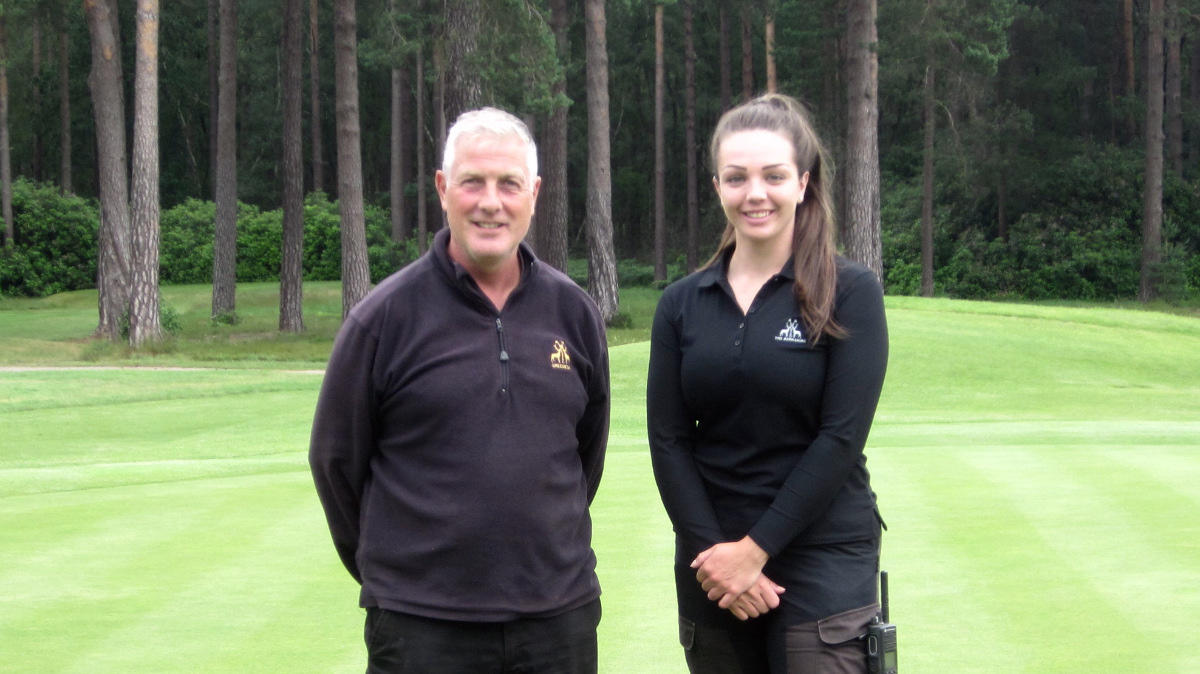
Emma Ballard: How did you get into greenkeeping?
Lucy Sellick: I was all set to go into the Navy. I did all the entrance exams, but while I was waiting, a neighbour was building a golf course so I knocked on the door and asked if I could give a hand at the weekend. I stayed there for 10 years!
Amanda Dorans: I wasn't really sure what I wanted to do. I went to work in a golf club for a seasonal role, which turned into a full time role. I moved around the golf club in quite different positions. I ended up working out on the golf course doing some divoting work and the course manager, Frank Clarkson, offered me a job. I kept both the clubhouse and the job on the greens crew for a year and then transferred over entirely and haven't looked back.
Sophie Bulpitt: I tried out a few different career options: working in a kitchen, in schools teaching sport to kids and then decided to go down the apprenticeship route. I found one for a local golf course. I wasn't even really aware of what the golf industry involved, so I just applied for it and I’ve been doing it ever since.
Anna Nilsson: I knew exactly what I wanted to be since I was five years old: I was going to be a solicitor. I went to university but after one and a half years, I realised I didn't want to be a solicitor. I worked with horses, competing internationally, and did some contract work, but I always loved hanging out at a golf course. I couldn't really play golf so I went into greenkeeping, just so I could go to the golf course every single day.
Lucy, after that first role, what was your next move?
Lucy: After 10 years I thought right, time to move on. I went to a career fair at Celtic Manor. They had no idea that I'd already been in greenkeeping for 10 years and they asked why would a woman want to come into the industry? They were surprised to hear I’d helped build a golf course! I was at Celtic Manor for nine years and saw European Tour events, remodellings and grow-ins, which was great.
Then I took on the deputy role at Saltford Golf Club in Bristol, which was my first step up into management. It was a long commute of 100 miles a day, back and forth from Cardiff, so that took a lot of commitment. I then applied for a couple of course managers position and was given the position at Wenvoe Castle.
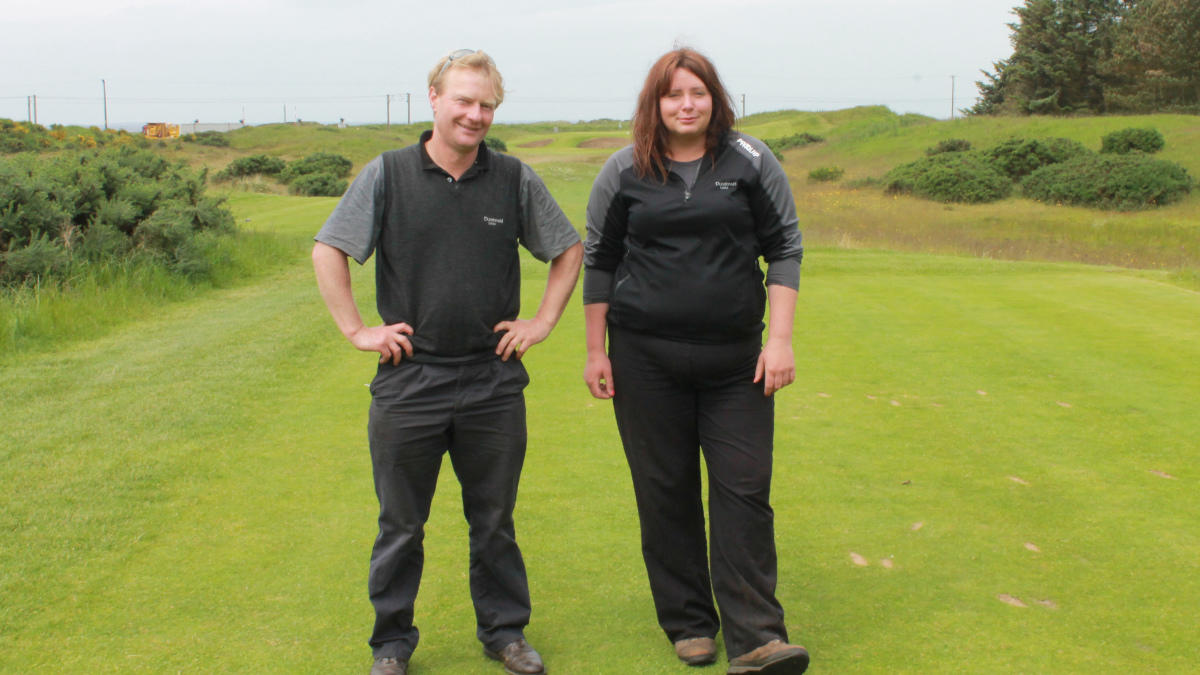
Sophie how long have you been greenkeeping?
Sophie: I've been in the industry for about five and a half years now. I started as an apprentice at East Berkshire Golf Club, did my Level 2 there, started my Level 3 and then came over to the Berkshire as an assistant. I completed my level 3 and then got the deputy position this January.
Anna could you tell us a little more about your career?
Anna: I'd been greenkeeping for a few years in Sweden. I had a bad accident and it knocked some sense into me. I was a course manager at the time and I reached my limit. I wasn't really enjoying living in Sweden as my friends and family were over in the UK. I had always loved The Belfry as it’s the spiritual home of the Ryder Cup and I thought, I want to work at that place. I went down from a course manager to a senior role, just to get a foot in at The Belfry. It's not always a path that you see laid out in front of you, but that is what’s so great about greenkeeping – you take all these twists and turns to end up in the position you want to be.
What do you enjoy most about your role?
Lucy: One of the main things about greenkeeping is we tend to be finding solutions to problems or challenges. My interest at the moment is irrigation as I'm upgrading a 47-year-old system. All my focus, knowledge and research is looking at how I can do that. For me, it's about the challenge of learning those different things.
Sophie: The Berkshire is quite an old course, so during winter months there's always loads to do, like drainage projects or finding ways to improve it, things like that. We’re also doing heather regeneration so we’re clearing trees, scraping back the organic layer and then using heather brashings to try and re-establish more heather.
Amanda: Sustainable management for golf is my passion. I totally believe that golf courses are well placed to be part of the community and protect and enhance biodiversity. From the golf course management side of things, I lovebunker building and landscape management and I get a real pleasure out of seeing a finished project.
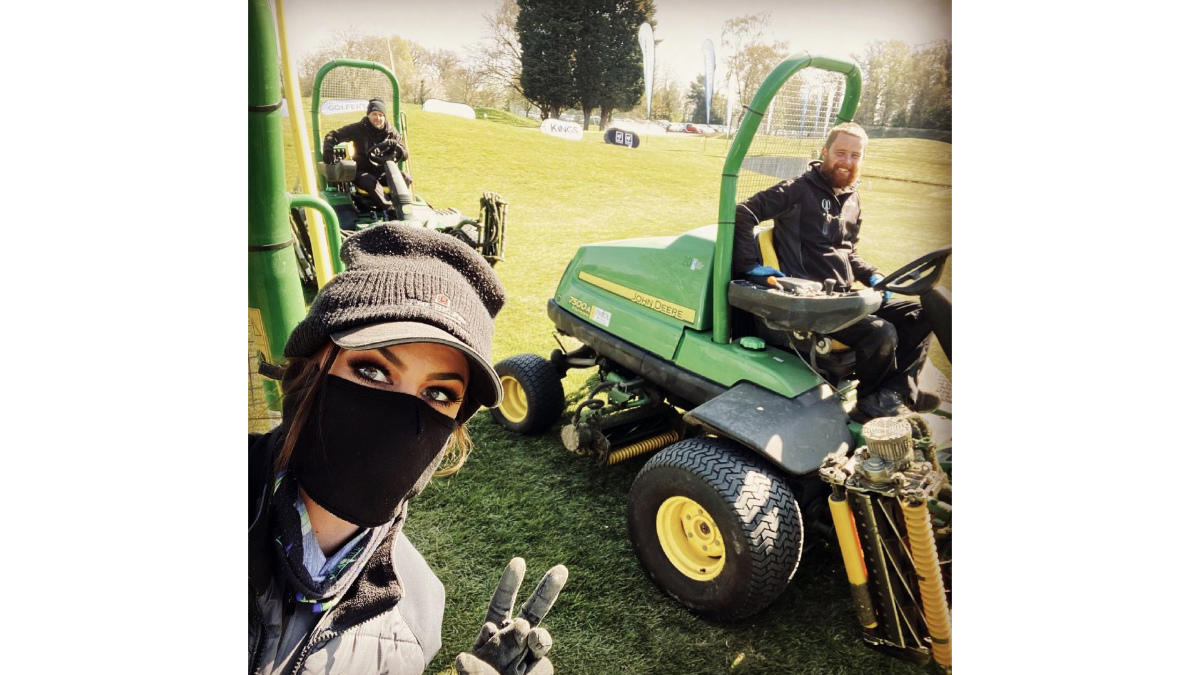
What’s the best thing about being a greenkeeper?
Sophie: I'd say the opportunity to travel and see new places and meet new people that are always welcoming, whether you're in a different country or down the road. I spent time in the States, met Amanda for the Solheim Cup, and it just brings everyone together and the opportunities are endless.
Amanda: I love the workplace culture; they're my family. Anyone who comes into golf is gaining a new family and that's really important to me. People are really welcoming and there are also so many opportunities for learning and development and nurturing.
Lucy: There’s a supportive community, we're all peers and everyone pulls for each other. If you have a similar problem, you know somebody the other side of the world, now with social media, or down the road at the neighbouring golf club has probably experienced something similar and you can tap into that community. Golf is this huge community of golfers, clubhouse managers and greenkeepers; we're all in it together.
Anna: We’ve got the best office in the world. When you pull out of the yard, early in the morning, and the sun is just about to come out over the course, you've got the wildlife there, you're alone, that's an unbeatable office. But there are a million things, so it’s a really tough question.
What has been the highlight of your career?
Amanda: I went to Brussels as one of the delegates representing UK golf at the European Parliament. That opened my eyes to what golf contributed to the global economy. Globally we’re a £5 billion economy and together we have quite a strong voice.
Lucy: I was selected on the BIGGA and Bernhard Delegation to [the Golf Industry Show] last year, which meant I went over to the States and saw how they do things. Meeting the worldwide community of people that will just freely share information with you was a big highlight of my career.
Anna: A career highlight must be getting Angus as a boss. My career highlight is actually getting good management behind me that pushes me, allows me to grow and has supported me so well. When you land a good management team behind you, the world is your oyster.
Amanda: That's such a lovely thing to hear, because I have always thought that about Frank and now Craig [Haldane]. I've literally struck gold with the amazing managers and leaders I have had. Having that has made me the person that I am. I go on about nurturing and I think we've got a responsibility to pass that on to others. I don't think I'll ever be as good as them, but I aspire to.
Anna: Aside from greenkeeping, the world can be like a ruthless place. But the course is always there to escape to, just from a mental health point of view. I think if more women actually knew how supportive this community is, we would have a lot more women coming into the job.
Are there any challenges that you’ve overcome that you are really proud of?
Anna: I’ve been very lucky in that I’ve never come into a workplace and they’ve said, ‘you’re a woman, you can’t do it’. The only negativity I have had is from other women saying ‘why would you go into that business?’. But from all the men that I've worked with, I’ve never encountered any negativity.
Lucy: Being course manager or head greenkeeper, you do get exposed to a bit of that social and cultural conditioning that leads to stereotyping. If someone new comes into the club, they'll go straight to one of the guys and won’t presume that I'm responsible for the estate. Back in my day, we didn't have the support, there was no internet, there was no social media. It helps build the confidence that women can put their hands up and say, yeah, I'll go and do that. I realised when I was greenkeeping, that I wasn't just setting an example for other women who may want to be greenkeepers, but I was also setting an example to golf clubs who were thinking about employing a woman.
Sophie: Personally, I’ve improved my confidence. I was a pretty shy youngster and going into an all-male team was daunting at first. Over the past two and a half years, I've had the backing of my head greenkeeper and course manager and they've really helped me realise that I can do the job just as well as anyone else and it's pushed me forward.
What are your career aspirations?
Amanda: My ambitions are more team-orientated and for golf in general: I truly believe in sustainability and I'd like to see golf still here in 100 years or more. We are the current custodians and I really want make sure that whatever we do, we futureproof. I really like to see people coming into greenkeeping and I want them to be happy and have the opportunities that I've had.
Lucy: I always talk about improving, not just myself but the team I work with, the surfaces, the working environment. Going to work happy is important as you spend so much time in the workplace, so just continue to improve your knowledge and personal development, which builds up and gives you the opportunity to move forward.
Sophie: I'd love to have a course manager's position one day, but one thing that I really want to do more is bringing in youngsters. We've just got a new guy join our team, he's come down from Scotland, and just helping to improve him over the past few months and getting him to do jobs that he hadn't done before is something that I've really been enjoying and something that I definitely want to continue to do in the future.
Anna: What I would like to do is to get more women into greenkeeping. Yes, it is male-dominated, but I think women have a role to play in that. I want to break down that barrier and say, ‘come on, join this side, because it is pretty cool’. So that's my goal, but I'm also going to stay with Angus, [Jamie] Wade and Duncan [Brooks] and just learn as much as possible from them.
Is there anything that girls in particular need to be studying at school if they’re interested in getting into greenkeeping?
Amanda: I'd like to have spent more time in chemistry class and definitely would have taken biology. Maths is also a massive part of greenkeeping. Greenkeeping is really diverse and it's not just a practical job, there is a lot of theory as well. I just don't think people know that greenkeeping is a job and unless they have grown up on golf courses or playing golf, I think it's under-known. Everyone knows what a policeman or a fireman or firewoman is, but who knows what a greenkeeper is? So how do we drive awareness? I think we need to look at schools, but at first and second years, well before they start thinking about their subjects, and I think it'd be really good to get kids out onto the golf course and doing tours.
Anna: You can make this job as advanced or as simple as you want to; it's very organic and you decide how much you want to invest in the job. It can be a very scientific job or it can be a very chill job that you just come and be on the golf course. It’s good to get kids into this job but we mustn't forget that any age can start in greenkeeping. It can be the single mum, age 25, who doesn't have any experience but who can be taught at work. At The Belfry we work together with a college and we provide education for anyone coming into greenkeeping. We can have a 50-year-old come into the greenkeeping business and pick up the reins, so it's never too late to actually start greenkeeping. I had no idea what greenkeeping was, I’d seen it in the movie, that crazy little greenkeeper chasing a mole. You can’t do anything today without an education, but you can make a career in. If you work hard, that beats any education; you just have to have an interest and a willingness to learn.
Lucy: Gone are the days when it was just cutting grass and we can we can home in on specialist areas, such as IT or data collection. If you tell a 19-year-old that we've got robotic mowers coming into the industry and we're connecting irrigation through our phones, that makes it more appealing than just cutting grass in the rain. There are so many aspects that make it exciting.
What is the one piece of advice you would give to a woman or a girl who is looking at a career in greenkeeping?
Anna: Do it. It grows you, it challenges you and it makes you independent. Who wouldn’t want that? Do it. Don’t just sit and think that you can’t do it.
Sophie: I’d say don’t be afraid to stand out. Always aim to push yourself on a daily basis; set yourself goals and work towards them as I think that’s key to staying motivated. Put yourself in positions you wouldn't normally, such as going abroad on your own and meeting new people. Don’t be afraid to do it, you can’t go wrong.
Amanda: Greenkeeping has led to the happiest moments of my life. I’ve had challenges, I've had hard days and I've been tired, but above all I've had the best experiences of my life. I always kind of thought work was a chore and actually greenkeeping changed me; it’s a way of life and it’s really good life. My little boy sees the best of me because when I come home, I'm happy and I've been surrounded by great people, so it has a positive influence on my home life as well as my work life goals – go for it!
To find out more about careers in greenkeeping, browse the BIGGA website and get in touch if you'd like to discuss things further by emailing our friendly membership team at [email protected]
Author

Karl Hansell
Karl has been head of communications for BIGGA since March 2016. His duties include editing the monthly Greenkeeper International magazine, in addition to other communications activities for the association.

